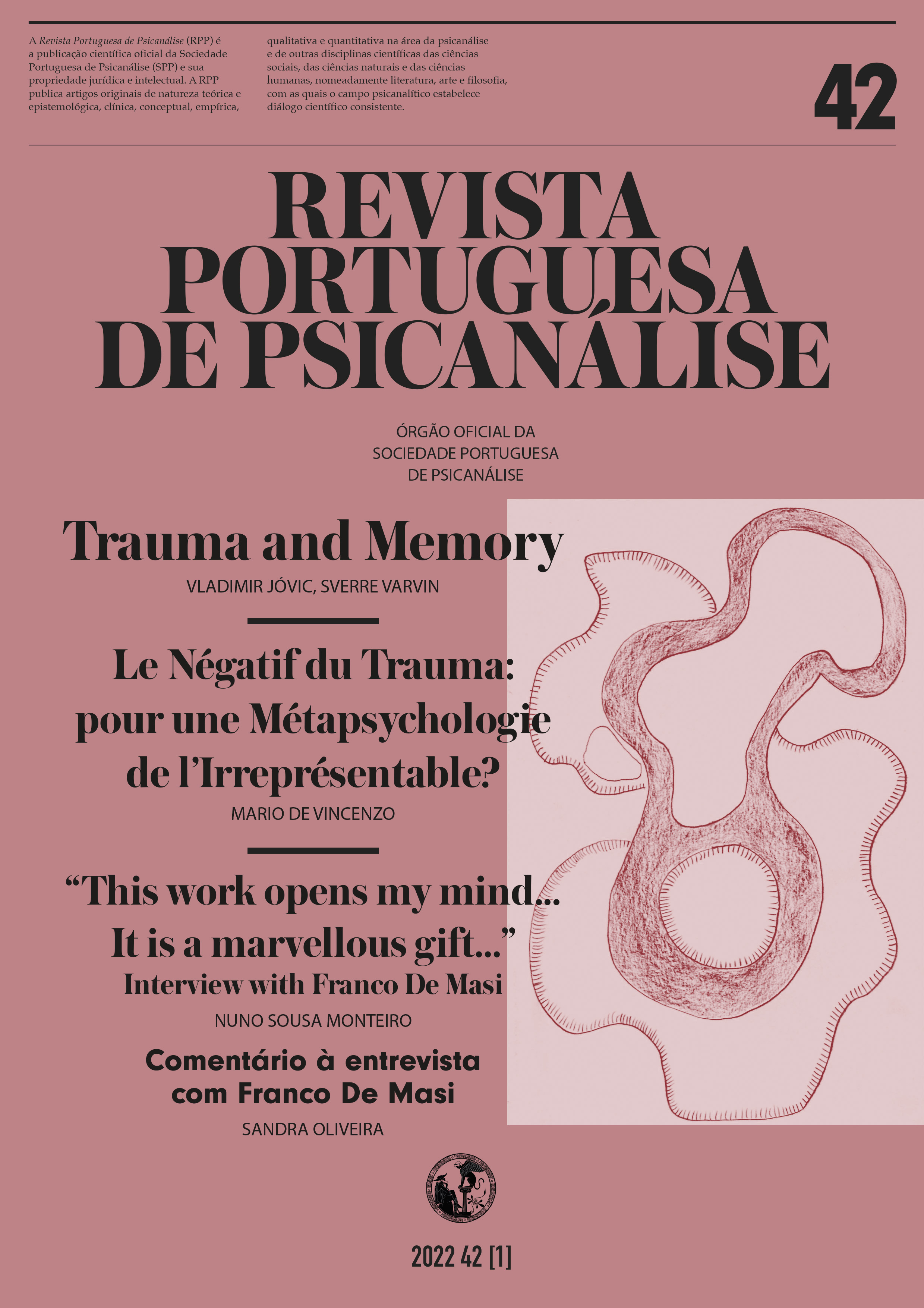Intervenção Clínica no Trauma: Implicações Terapêuticas

Résumé
Le traitement psychanalytique est communément désigné comme une indication thérapeutique pour les situations traumatiques, avec de graves perturbations dans le processus de pensée. Dans cet article, nous cherchons à synthétiser les connaissances sur l'expression clinique des événements traumatiques, en soulignant les principales implications thérapeutiques à la lumière de la psychanalyse aujourd'hui, et à présenter les principales caractéristiques cliniques au sein de l'école psychanalytique associées aux problèmes traumatiques.
Biographie de l'auteur
Rui Aragão Oliveira
Presidente da Comissão de Ensino e Psicanalista titular com funções didáticas da Soc. Portuguesa de Psicanálise
Références
- Abram, J. (2021). On Winnicott’s concept of trauma. International Journal of Psychoanalysis, 102(4), 778-793. https://doi.org/10.1080/00207578.2021.1932079
- Akhtar, S. (2014). Psychoanalytic Treatment of Trauma and the Analyst’s Personality. Psychoanalytic Inquiry, 34, 204–213. DOI: 10.1080/07351690.2014.889468
- Alayarian, Aida. (2011). Trauma, torture, and dissociation a psychoanalytic view. Karnac, London.
- Aragão Oliveira, R., Milliner, Eric, & Page, R. (2004). Psychotherapy with physically disabled patients. Psychoanalytic Psychotherapy, 58(4), 430-441. https://doi.org/10.1176/appi.psychotherapy.2004.58.4.430
- Bohleber, W. (2021). Concepts of external and internal reality and their relationship to traumatic experiences. European Psychoanalytical Federation Bulletin 75.
- Bohleber, W., & Leuzinger-Bohleber, M. (2016). The special problem of interpretation in the treatment of traumatized patients. Psychoanalytical Inquiry, vol. 36(1) 60-76. https://doi.org/10.1080/07351690.2016.1112223
- Dalenberg, C. J. (2000). Countertransference and the treatment of trauma. American Psychological Association. https://doi.org/10.1037/10380-000
- Diamond, M. (2020). Return of the repressed: revisiting dissociation and the psychoanalysis of the traumatized mind. Journal of the American Psychoanalytical Association 68(5):839-874. https:/doi.org/10.1177/0003065120964929
- Ferenczi, S. (1933). Confusion of the Tongues Between the Adults and the Child – (the Language of Tenderness and of Passion). The International Journal of Psychoanalysis 30 (1949), 225–230.
- Ferrajão, P., Aragão Oliveira, R. (2016). The Effects of Combat Exposure, Abusive Violence and Sense of Coherence on PTSD and Depression in Portuguese Colonial War Veterans. Psychological Trauma Theory Research Practice and Policy 8(1):1-8 · January 2016. https://doi.org/10.1037/tra0000043
- Ferrajão, P., Aragão Oliveira, R. (2016a). Portuguese War Veterans: Moral Injury and Factors Related to Recovery From PTSD. Qualitative Health Research 26(2):204-214 · January 2016. https://doi.org10.1177/1049732315573012
- Freud, S. (1887-1904). The Complete Letters of Sigmund Freud to Wilhelm Fliess 1887-1904, ed. and trans. J.M. Masson. Cambridge, MA: Harvard Univ. Press, 1985.
- Freud, S. (1895). Project for a scientific psychology. S. E., 1.
- Freud, S. (1896). The aetiology of hysteria. S. E., 3
- Freud, S. 1914. “Remembering, Repeating and Working Through.” S.E 12: 145–156.
- Freud, S. (1920). Beyond the pleasure principle. SE 18.
- Levine, H. (2014). Psychoanalysis and trauma. Psychoanalytic Inquiry, 34:214–224, 2014. https://doi.org/10.1080/07351690.2014.889475
- Levine, H. (2021). Trauma, process and representation, The International Journal of Psychoanalysis, 102(4), 794-807. https://doi.org/10.1080/00207578.2020.1841923
- Rosenbaum, B., & Varvin, S. (2007). The influence of extreme traumatization on body, mind and social relations. International Journal of Psychoanalysis, 88(6). https://doi.org/10.1111/j.1745-8315.2007.tb00758.x
- Scarfone, D. (2017). Ten short essays on how trauma is inextricably woven into psychic life. The Psychoanalytic Quarterly, 2017 Volume LXXXVI, Number 1, 21-43. https://doi.org/10.1002/psaq.12125
- Varvin, S. (2003). Trauma and its after-effects. In Sverre Varvin & Vamik Volkan (ed.) Violence or dialogue? Psychoanalytic insights on terror and terrorism (pp. 206-216). International Psychoanalytical Association. London.